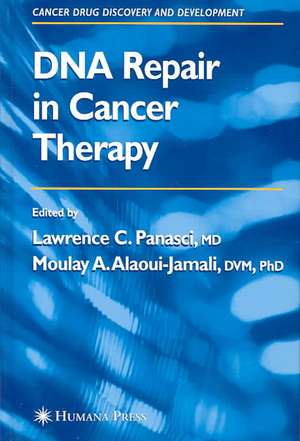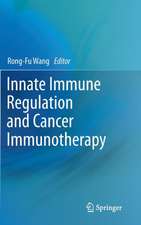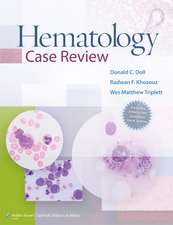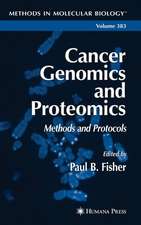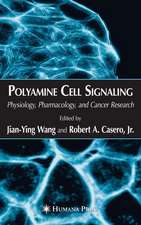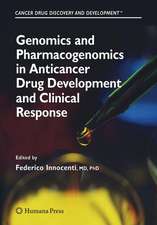DNA Repair in Cancer Therapy: Cancer Drug Discovery and Development
Editat de Lawrence C. Panasci, Moulay A. Alaoui-Jamalien Limba Engleză Hardback – 19 mar 2004
| Toate formatele și edițiile | Preț | Express |
|---|---|---|
| Paperback (1) | 1099.56 lei 43-57 zile | |
| Humana Press Inc. – 19 noi 2010 | 1099.56 lei 43-57 zile | |
| Hardback (1) | 1105.77 lei 43-57 zile | |
| Humana Press Inc. – 19 mar 2004 | 1105.77 lei 43-57 zile |
Din seria Cancer Drug Discovery and Development
- 5%
 Preț: 1474.98 lei
Preț: 1474.98 lei - 5%
 Preț: 1108.35 lei
Preț: 1108.35 lei - 5%
 Preț: 1415.75 lei
Preț: 1415.75 lei - 5%
 Preț: 1370.19 lei
Preț: 1370.19 lei - 5%
 Preț: 1452.28 lei
Preț: 1452.28 lei - 5%
 Preț: 1316.74 lei
Preț: 1316.74 lei - 5%
 Preț: 1439.50 lei
Preț: 1439.50 lei - 5%
 Preț: 1113.63 lei
Preț: 1113.63 lei - 5%
 Preț: 1126.24 lei
Preț: 1126.24 lei - 24%
 Preț: 1037.59 lei
Preț: 1037.59 lei - 5%
 Preț: 1466.37 lei
Preț: 1466.37 lei - 5%
 Preț: 1350.78 lei
Preț: 1350.78 lei - 5%
 Preț: 1417.54 lei
Preț: 1417.54 lei - 5%
 Preț: 1113.46 lei
Preț: 1113.46 lei - 5%
 Preț: 1428.54 lei
Preț: 1428.54 lei - 5%
 Preț: 1429.80 lei
Preț: 1429.80 lei - 5%
 Preț: 782.10 lei
Preț: 782.10 lei - 5%
 Preț: 1438.58 lei
Preț: 1438.58 lei - 5%
 Preț: 1110.32 lei
Preț: 1110.32 lei - 5%
 Preț: 1434.39 lei
Preț: 1434.39 lei - 5%
 Preț: 1365.82 lei
Preț: 1365.82 lei - 5%
 Preț: 1461.08 lei
Preț: 1461.08 lei - 5%
 Preț: 1106.86 lei
Preț: 1106.86 lei - 5%
 Preț: 982.18 lei
Preț: 982.18 lei - 5%
 Preț: 727.80 lei
Preț: 727.80 lei - 5%
 Preț: 1331.76 lei
Preț: 1331.76 lei - 5%
 Preț: 1297.40 lei
Preț: 1297.40 lei - 5%
 Preț: 1124.59 lei
Preț: 1124.59 lei - 5%
 Preț: 1433.10 lei
Preț: 1433.10 lei - 5%
 Preț: 1110.90 lei
Preț: 1110.90 lei - 5%
 Preț: 1317.76 lei
Preț: 1317.76 lei - 5%
 Preț: 1464.91 lei
Preț: 1464.91 lei - 5%
 Preț: 1939.63 lei
Preț: 1939.63 lei - 5%
 Preț: 1418.48 lei
Preț: 1418.48 lei - 5%
 Preț: 1438.94 lei
Preț: 1438.94 lei - 5%
 Preț: 1100.30 lei
Preț: 1100.30 lei - 5%
 Preț: 1109.96 lei
Preț: 1109.96 lei - 5%
 Preț: 990.58 lei
Preț: 990.58 lei - 5%
 Preț: 1443.13 lei
Preț: 1443.13 lei - 5%
 Preț: 1428.91 lei
Preț: 1428.91 lei - 5%
 Preț: 787.58 lei
Preț: 787.58 lei - 5%
 Preț: 1311.72 lei
Preț: 1311.72 lei - 5%
 Preț: 1331.76 lei
Preț: 1331.76 lei - 5%
 Preț: 1113.11 lei
Preț: 1113.11 lei - 5%
 Preț: 1440.76 lei
Preț: 1440.76 lei
Preț: 1105.77 lei
Preț vechi: 1163.97 lei
-5% Nou
Puncte Express: 1659
Preț estimativ în valută:
211.61€ • 219.59$ • 176.87£
211.61€ • 219.59$ • 176.87£
Carte tipărită la comandă
Livrare economică 17-31 martie
Preluare comenzi: 021 569.72.76
Specificații
ISBN-13: 9781588292988
ISBN-10: 1588292983
Pagini: 363
Ilustrații: XI, 363 p. 50 illus.
Dimensiuni: 155 x 235 x 26 mm
Greutate: 0.7 kg
Ediția:2004
Editura: Humana Press Inc.
Colecția Humana
Seria Cancer Drug Discovery and Development
Locul publicării:Totowa, NJ, United States
ISBN-10: 1588292983
Pagini: 363
Ilustrații: XI, 363 p. 50 illus.
Dimensiuni: 155 x 235 x 26 mm
Greutate: 0.7 kg
Ediția:2004
Editura: Humana Press Inc.
Colecția Humana
Seria Cancer Drug Discovery and Development
Locul publicării:Totowa, NJ, United States
Public țintă
Professional/practitionerCuprins
Content.- 1 Clinical Resistance to Alkylators: Status and Perspective.- 2 Role of Nonhomologous End-Joining and Recombinational DNA Repair in Resistance to Nitrogen Mustard and DNA Crosslinking Agents.- 3 Repair of DNA Interstrand Crosslinks Produced by Cancer Chemotherapeutic Drugs.- 4 Chemosensitization to Platinum-Based Anticancer Drugs: Current Trends and Future Prospects.- 5 Regulation of DNA Repair and Apoptosis by p53 and Its Impact on Alkylating Drug Resistance of Tumor Cells.- 6 Stress-Activated Signal Transduction Pathways in DNA Damage Response: Implications for Repair, Arrest, and Therapeutic Interventions.- 7 Overcoming Resistance to Alkylating Agents by Inhibitors of O6-Alkylguanine-DNA Alkyltransferase.- 8 Cellular Protection Against the Antitumor Drug Bleomycin.- 9 Potential Role of PARP Inhibitors in Cancer Treatment and Cell Death.- 10 Relationship Among DNA Repair Genes, Cellular Radiosensitivity, and the Response of Tumors and Normal Tissues to Radiotherapy.- 11 Strand-Break Repair and Radiation Resistance.- 12 V(D)J Recombination and DNA Double-Strand-Break Repair: From Immune Deficiency to Tumorigenesis.- 13 Inherited Disorders of Genomic Instability and Cancer Susceptibility.- 14 Role of BRCA1 and BRCA2 in DNA Repair and Potential Impact on Therapeutics.- 15 Genetic Variations in DNA Repair: Their Implications in Human Cancer Risk, Prevention, and Therapy.
Recenzii
...gives a comprehensive review of the modern status of the DNA repair field for cancer researchers and clinical practitioners and provides a solid basis for in-depth study of different areas in this field...The book is a timely publication with a significant intended audience that will be served well. The book is well planned, well written, comprehensive, and addresses recent findings in the field. -Doody's Health Sciences Book Review Journal
"...extensive and extremely detailed...a comprehensive review of DNA repair." - The Annals of Pharmacotherapy
"Comprehensive and cutting-edge, for both cancer researchers and practicing oncologists dealing with the hallmark 'relapse; or 'drug resistance' phenomena on a daily basis...." Tumori
"...extensive and extremely detailed...a comprehensive review of DNA repair." - The Annals of Pharmacotherapy
"Comprehensive and cutting-edge, for both cancer researchers and practicing oncologists dealing with the hallmark 'relapse; or 'drug resistance' phenomena on a daily basis...." Tumori
Textul de pe ultima copertă
Because of drug resistance, currently available anticancer therapies-drugs, radiotherapy, and other biological agents-have limited efficacy in treating cancer. In DNA Repair in Cancer Therapy, leading cancer researchers and oncologists comprehensively review the many recent developments in DNA repair that have potential for translational and clinical applications. The authors explain in detail the various mechanisms by which cancer cells can circumvent anticancer therapy and limit its usefulness in patients. They also review the clinical impact of such novel inhibitors of DNA repair mechanisms as methylguanine-DNA-methyltransferase. Inhibitors of such other DNA repair enzymes as PARP and DNA-PK, now under development and close to clinical trials, are also examined.
Comprehensive and cutting-edge, DNA Repair in Cancer Therapy surveys-for both cancer researchers and practicing oncologists dealing with hallmark "relapse" or "drug resistance" phenomena on a daily basis-the many exciting new uses of DNA repair inhibitors, either alone or in combination with anticancer therapies.
Comprehensive and cutting-edge, DNA Repair in Cancer Therapy surveys-for both cancer researchers and practicing oncologists dealing with hallmark "relapse" or "drug resistance" phenomena on a daily basis-the many exciting new uses of DNA repair inhibitors, either alone or in combination with anticancer therapies.
Caracteristici
Includes supplementary material: sn.pub/extras
